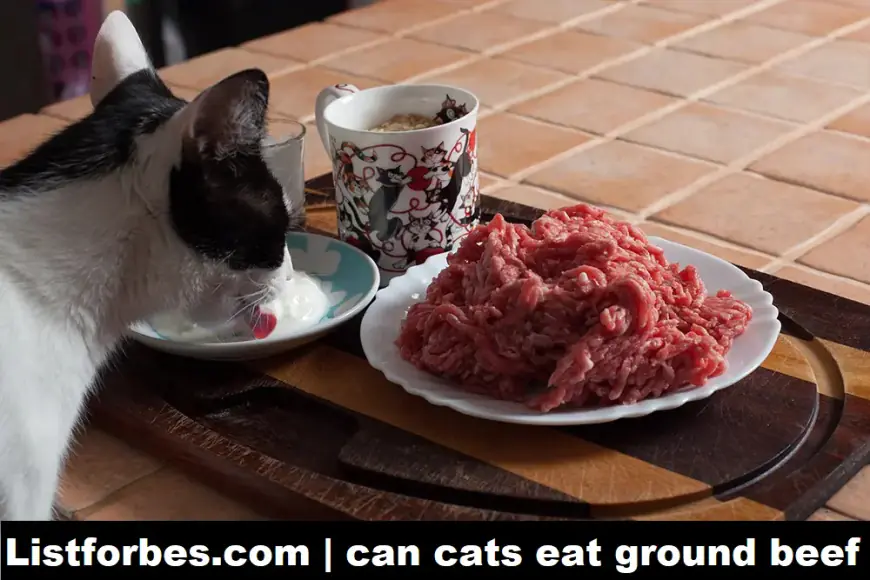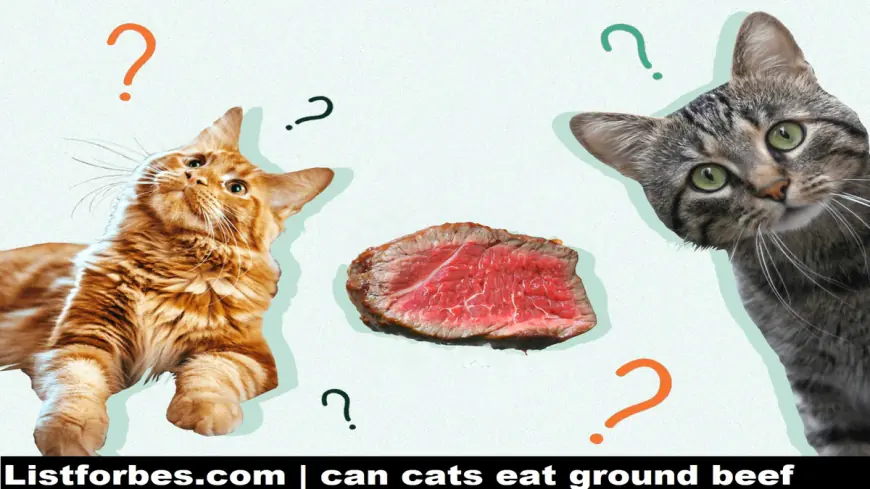Can Cats Eat Ground Beef? Exploring the Benefits and Risks
This composition explores whether can cats eat ground beef, the implicit benefits and pitfalls, and how to safely incorporate it into your cat's diet if you choose to do so.

Preface
As cat possessors, we frequently find ourselves wondering whether certain mortal foods are safe for our nimble musketeers. Among these foods, ground beef is a common query. Cats are obligate herbivores, meaning their diet in the wild consists primarily of meat. But does this mean that ground beef is a suitable option for them?
Understanding a Cat's Dietary Needs
Drive Herbivores: What It Means
Cats are obligate herbivores, which means they bear a diet that's primarily composed of beast-ground proteins. Unlike humans, or indeed, tykes, cats cannot thrive on a diet that includes a significant quantity of factory-ground foods. Their digestive systems are specifically adapted to reuse and decide nutrients from meat. List Forbes
Protein cats bear a high-protein diet to support their muscles, skin, and overall health. Protein is the primary source of energy for cats.
Amino Acids: cats need specific amino acids, similar to taurine, that are set up abundantly in beast apkins. These amino acids are pivotal for colorful fleshly functions, including heart health and vision.
Vitamins and minerals Certain vitamins and minerals, like Vitamin A and D, are stylishly attained from beast sources in a form that cats can fluently use.
Given this, it's clear that meat is essential to a cat's diet, but the question remains: Is ground beef a good source of the needed nutrients?
The nutritional profile of ground beef
Ground beef is a protean and generally consumed meat that's rich in protein, fats, and essential nutrients. Then there is a breakdown of what ground beef offers.
Protein Ground beef is an excellent source of high-quality protein, which is vital for a cat's health.
Fat Ground beef contains fat, which provides energy. Still, the fat content can vary depending on the cut of beef and how it's set.
Ground beef is rich in several essential vitamins and minerals, including iron, zinc, and B vitamins (similar to B12), all of which are important for maintaining a cat's health.
Still, while ground beef contains numerous nutrients salutary to cats, there are also implicit pitfalls associated with feeding it to your nimble friend, especially if it isn't prepared correctly.
Benefits of Feeding cats eat ground beef
High-quality protein source
As obligate herbivores, cats bear high levels of protein, and ground beef can be an excellent source of this nutrient. The protein in ground beef can help maintain your cat's muscle mass, support their vulnerable system, and give them energy.
Muscle conservation Protein is essential for maintaining spare muscle mass, particularly in active or growing cats.
Immune Support The amino acids in proteins are pivotal for producing antibodies and other vulnerable-affiliated functions.
Energy Protein serves as a primary energy source for cats, fueling their diurnal conditioning and metabolic processes.
Rich in essential nutrients
Ground beef isn't just a source of protein; it also contains several essential nutrients that contribute to a cat's overall health.
Iron is important for the production of hemoglobin, which carries oxygen in the blood.
Zinc is pivotal for maintaining a healthy fleece and skin and also supports the vulnerable system.
Vitamin B12 is essential for heart function and the production of red blood cells.
Delectability
Numerous cats find the taste and texture of ground beef largely palatable. This can be especially important if your cat is a picky eater or if you're trying to encourage them to eat a more protein-rich diet.
Appealing Flavor The rich, meaty flavor of ground beef is frequently appealing to cats, which can make it easier to introduce into their diet.
Versatility Ground beef can be prepared in colorful ways, making it a protean component that can be fluently incorporated into your cat's diet.
pitfalls and considerations of feeding ground beef to cats
Fat content and rotundity
One of the primary concerns with feeding ground beef to cats is the fat content. While cats do need fat in their diet, too much can lead to rotundity and associated health issues, such as diabetes and heart complaints.
Adipose Cuts Some ground beef can contain high amounts of fat, particularly if it's made from adipose cuts of meat. This can contribute to inordinate calorie input and weight gain in cats.
Balanced Diet It’s important to ensure that the ground beef you feed your cat is spare and part of a balanced diet that includes other sources of nutrition.
Bacterial impurity
Raw ground beef, like any raw meat, can be defiled with dangerous bacteria such as Salmonella and E. coli. These bacteria can cause serious illness in both cats and humans.
Raw meat pitfalls Feeding raw ground beef increases the threat of bacterial infections, which can lead to gastrointestinal issues similar to puking and diarrhea.
Safe Handling If you choose to feed raw ground beef, it's pivotal to handle it safely, ensure it's fresh, and conceivably consult with your veterinarian about the pitfalls involved.
Nutritive Imbalance
Feeding your cat ground beef alone doesn't provide a balanced diet. While it offers protein and some essential nutrients, it lacks other critical nutrients that cats need, such as taurine, calcium, and certain vitamins.
Taurine Deficiency Taurine is an amino acid that's critical for heart and eye health in cats. While ground beef contains some taurine, it may not be enough to meet your cat's requirements.
Lack of calcium Ground beef doesn't give enough calcium, which is necessary for strong bones and teeth.
Vitamin Imbalances A diet consisting solely of ground beef may lead to scarcity or imbalances in other vitamins and minerals.
Seasoning and Complements
Another threat to consider is that ground beef prepared for human consumption frequently contains seasonings, complements, and preservatives that can be dangerous to cats.
poisonous constituents like onion, garlic, and certain spices are poisonous to cats and should never be included in their diet.
Preservatives Some ground beef products may contain preservatives that aren't suitable for cats.

How to Safely Incorporate Ground Beef into Your Cat's Diet
Choosing the Right Ground Beef
When choosing ground beef for your cat, it's essential to choose the right type to ensure it's safe and healthy for them to eat.
spare ground beef Opt for spare or extra-lean ground beef, which has a lower fat content and is less likely to contribute to weight gain.
Newness ensures that the ground beef is fresh and has been handled duly to reduce the threat of bacterial impurity.
Proper Preparation
Proper medication for ground beef is pivotal to making it safe for your cat to eat. Then there are some guidelines to follow.
Cook Completely Cuisine Ground beef completely kills dangerous bacteria that could cause illness. Make sure the beef is completely cooked, with no pink areas remaining.
No Seasoning Don't add any seasonings, canvases, or other constituents that could be dangerous to your cat. Plain, braised ground beef is the safest option.
Portion Control Feed ground beef in moderation as part of a balanced diet. A small portion mixed with your cat's regular food can be a beneficial way to introduce it.
Balancing the Diet
To ensure your cat receives all the necessary nutrients, ground beef should only be a part of a varied diet that includes other protein sources, vitamins, and minerals.
Complete cat food Use ground beef as a supplement to a complete and balanced cat food diet, which is specifically formulated to meet all of a cat's nutritive requirements.
Consult a veterinarian. Before making any significant changes to your cat's diet, consult with your veterinarian to ensure it's applicable to your cat's health and life.
Examiner: Your Cat's Health
After introducing ground beef into your cat's diet, it's important to check their health and well-being for any signs of digestive problems or other issues.
Watch for Symptoms Keep an eye out for any signs of gastrointestinal torture, such as puking, diarrhea, or changes in appetite.
Acclimate Consequently If your cat shows any adverse responses, discontinue feeding ground beef and consult with your veterinarian.
Alternatives to Ground Beef
Other protein sources
Still, there are several other protein sources you can consider.
If you're considering adding variety to your cat's diet but are concerned about the pitfalls associated with ground beef,.
funk A spare source of protein that's frequently well-permitted by cats. Cooked funk bones without seasoning can be a safe option.
Turkey Another spare meat option that's rich in protein and low in fat.
Fish like salmon or tuna can be a good source of protein and omega-3 adipose acids, but they should be fed in moderation due to the threat of mercury and other pollutants.
Commercial cat food
Commercial cat foods are specifically formulated to meet all of a cat's nutritive requirements. High-quality cat foods frequently include a variety of protein sources, along with essential vitamins and minerals.
Wet Food Wet cat food can provide a good balance of humidity and nutrition and frequently includes high-quality protein sources.
Dry Food While not as humidity-rich as wet food, dry cat food can be an accessible option that's fortified with necessary nutrients.
Manual Diets
Some cat possessors prefer to prepare manual diets for their cats, but this requires careful planning to ensure all nutritive requirements are met.
Balanced fashions If you choose to make manual cat food, use brands that are nutritionally balanced and approved by a veterinarian.
Supplements: Consider adding supplements to manual diets to ensure your cat receives all the necessary vitamins and minerals.
Conclusion
Feeding ground beef to your cat can offer some benefits, similar to furnishing a high-quality protein source that's both nutritional and palatable. Still, it also comes with pitfalls, including the eventuality of nutritive imbalances, bacterial impurities, and rotundity if not set and fed rightly.
To safely incorporate ground beef into your cat's diet, choose spare, fresh beef, cook it completely without any seasoning, and feed it in moderation as part of a balanced diet. Always cover your cat's health after introducing new foods, and consult with your veterinarian to ensure that your cat's diet meets all of their nutritive requirements.
In conclusion, while ground beef can be a safe and nutritional addition to your cat's diet, it shouldn't replace a complete and balanced cat food. By taking the necessary preventives and being aware of your cat's overall diet, you can ensure that your nimble friend enjoys a healthy, well-rounded diet that supports their long-term well-being.
Also Read This Article : Dallas Mavericks vs Timberwolves Match Player Stats: Analyzing and Game Impact
What's Your Reaction?














































